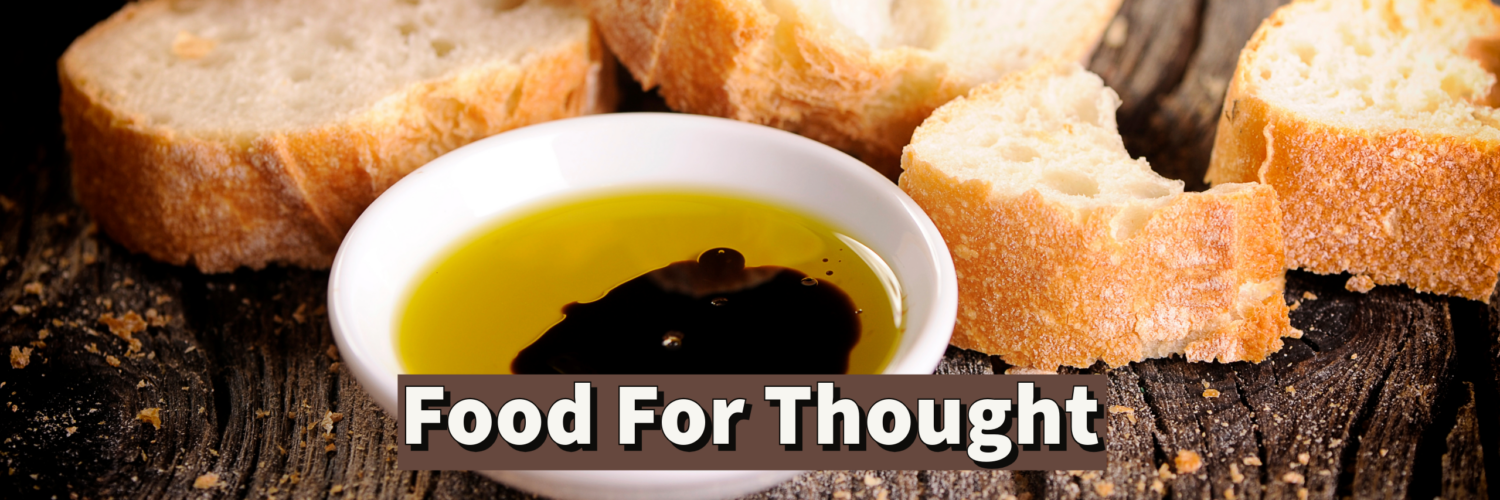
by Tony Leman
In the book of Proverbs, King Solomon admonishes young people to, “incline your ear to wisdom and apply your heart to understanding…and to seek her as silver, and search for her as for hidden treasures” (Proverbs 2:2, 4). Therefore, let’s begin our search for further understanding found in scripture on various aspects of God’s creation that can benefit us.
Let’s first take note of the food Abraham quickly brought together with the help of his wife, Sarah, and one of his young servants for the pre-incarnate Jesus Christ and two angels. “So Abraham hurried into the tent to Sarah and said, ‘Quickly, make ready three measures of fine meal; knead it and make cakes.’ And Abraham ran to the herd, took a tender and good calf, gave it to a young man, and he hastened to prepare it. So he took butter and milk and the calf which he had prepared, and set it before them; and he stood by them under the tree as they ate” (Genesis 18:6-8).
Notice carefully what was served up for the Creator and the two angels. The items included: cakes made of flour (fine meal), butter, milk, and a tender and fat calf that had been prepared. Clearly, Abraham wanted to serve food that was not only acceptable, but would be well received by His Creator. Scripture records that the Word and the two angels ate it showing their acceptance of all aspects of this meal from the dairy, to the meat, to the complex carbohydrates found within the meal. This example provides understanding because it shows food combinations that can and do work well together. God has provided animal protein for His people to enjoy, something the world with its climate change agenda is currently striving to frame as bad.
Of course, while in the flesh, Christ showed that another good combination is fish with bread. The Apostle John records the miracles of the feeding the multitudes with bread made of barley (John 6:9), but the feeding of the four thousand men (besides women and children) may have been a different grain (Matthew 15:32-39; 16:9-10). Jesus Christ not only fed the multitudes this combination of fish and bread through miracles recorded in the gospels, but also after His resurrection from the dead, we read an account where He fed the disciples fish and bread too. The cooking method was over coals and by the lakeside with the disciples (John 21:9-14).
While on the bread topic, notice what Boaz encouraged Ruth to do with bread he gave her. “Now Boaz said to her at mealtime, ‘Come here, and eat of the bread, and dip your piece of bread in the vinegar.’ So she sat beside the reapers, and he passed parched grain to her; and she ate and was satisfied, and kept some back” (Ruth 2:14). It is known in the baking community that adding vinegar to bread enhances the flavour, helps to moisten the bread, and aids in digestion. Here is further wisdom found in God’s Word that gives better understanding!
Let’s turn the spotlight now on what Jacob does with Laban’s sheep as recorded in the book of Genesis. We can gain some good understanding on fertility helps through noticing the wisdom in action that Jacob exercises whilst raising sheep. Notice: “Now Jacob took for himself rods of green poplar and of the almond and chestnut trees, peeled white strips in them, and exposed the white which was in the rods. 38 And the rods which he had peeled, he set before the flocks in the gutters, in the watering troughs where the flocks came to drink, so that they should conceive when they came to drink. 39 So the flocks conceived before the rods, and the flocks brought forth streaked, speckled, and spotted” (Genesis 30:37-39). Let’s break this down a little, Jacob took some branches (rods) of green poplar, almond, and chestnut trees and peeled back the bark to expose the inner parts of the branches so that sap and the internal make-up of the branches could be released within the water in the water troughs. Why would Jacob have done this in the water troughs? When you look into the benefits of these three trees, one common benefit sticks out. What do you think it is? These three trees are known for helping both animal and human fertility. Consider, “Poplar cuttings are a beneficial supplement for increasing the reproductive rate of ewes grazing drought pasture during the pre-mating and mating periods” (Research Gate.com, The effect of different levels of poplar (Populus) supplementation on the reproductive performance of ewes grazing low quality drought pasture during mating, Link to Research accessed 17th November 2023)
And, the following states some scientific observation on the benefits of the Chestnut tree: “CPs [Chestnut Polysaccharides), key substances in chestnut, have been investigated extensively; they are known to inhibit cancer cell proliferation, enhance endurance performance…Chestnut polysaccharides (CP’s) improved sperm quality” therefore Chestnut also helps increase fertility (National Library of Medicine, Chestnut polysaccharides benefit spermatogenesis through improvement in the expression of important genes, https://www.ncbi.nlm.nih.gov/pmc/articles/PMC7343452/, accessed 17th November 2023). The Almond tree is also known to help increase fertility.
Therefore, what Jacob was doing was exercising wisdom in increasing numbers and strength of flocks through allowing sap and other ingredients within the rods of the three trees to be released in the water and was then drunk and digested by the sheep. God clearly was blessing Jacob, but Jacob was doing his part using God’s creation to help aid in what God could do through him.
Lastly, let’s take a look at milk. What benefits might milk have that are alluded to in scripture? Notice this account of Jael with evil King Sisera. “And Jael went out to meet Sisera, and said to him, ‘Turn aside, my lord, turn aside to me; do not fear.’ And when he had turned aside with her into the tent, she covered him with a blanket. 19 Then he said to her, ‘Please give me a little water to drink, for I am thirsty.’ So she opened a jug of milk, gave him a drink, and covered him” (Judges 4:18-19). Why do you think Jael gave Sisera milk instead of water? Afterall, Sisera mentioned he was thirsty and water would best quench his thirst. The reason may have been, because she desired that Sisera fall asleep so that she could kill him whilst he was in a deep sleep. Jael therefore used wisdom to help put Sisera to sleep because studies have shown that “Milk (and other dairy products) are a really good source of tryptophan. It’s an amino acid that can help promote sleep” (Grahamsfamilydairy.com, Does drinking a glass of milk before bed help you sleep?, https://www.grahamsfamilydairy.com/news-events/blog/does-drinking-a-glass-of-milk-before-bed-help-you-sleep/, accessed 17th November 2023). Additionally, “Tryptophan can be converted to serotonin and melatonin, consequently inducing relaxation and sleepiness” (National Library of Medicine, Milk Collected at Night Induces Sedative and Anxiolytic-Like Effects and Augments Pentobarbital-Induced Sleeping Behavior in Mice, https://www.ncbi.nlm.nih.gov/pmc/articles/PMC4638207/, accessed on 17th November 2023).
Jael was praised and honoured by Deborah as recorded in Judges 5:24-25. You will notice in Proverbs concerning milk, that goat’s milk in particular is strongly recommended by Solomon as food to enjoy. “You shall have enough goats’ milk for your food, for the food of your household, and the nourishment of your maidservants” (Proverbs 27:27). You might like to enjoy a glass of warm milk if you ever have trouble sleeping or relaxing.
In conclusion, God admonishes young people in the book of Proverbs to diligently seek out wisdom and understanding. God’s Word is a valuable treasure chest of knowledge. We have seen that God has recorded much advice and help in His Word, if one will simply take the time to “dig it out.” We have just scratched the surface in this article, but hopefully it has ignited a desire to regularly and carefully look into God’s Word to glean more of the treasures of understanding and wisdom that it contains.

